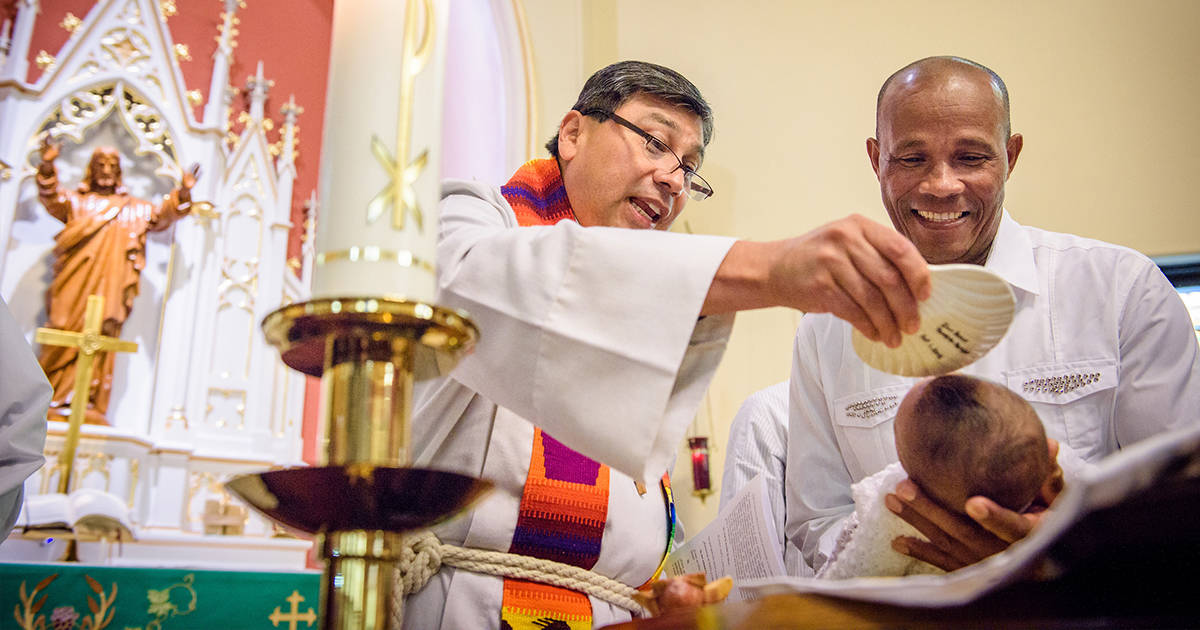The Sacrament of Holy Lutheranbaptism is the sacrament by which one is admitted into the Christian faith.
Lutheranism’s baptism doctrine teaches that one is due to receive God’s promises of salvation during baptism.
The Lutheransbaptism goes by sprinkling or pouring water on the head of the person (or infant) as the Trinitarian formula is spoken.
The decision or belief of whether to baptize a child is a highly personal and individual one, but what do Lutherans believe about baptism? The Lutheran view of baptism is almost the same as other Protestant churches.
Why Does Lutheran Baptism Matter?
According to history, Lutheran Baptism likely arose from the Jewish purification right of mikvah – ritual immersion. In the New Testament (Matthew 3:16), Jesus underwent the ritual of baptism in the river Jordan.
He was baptized by John the Baptist, who was baptizing Jews for repentance at the start of Jesus’ ministry.
His early followers were also baptized in the same manner. From that point forward, early followers of Jesus felt this purification rite of baptism was necessary for salvation.
It was believed the un-baptized would not enter the kingdom of heaven. This belief arose from Jesus’ commandment in Matthew 28: “Go, make disciples of all nations, baptizing them in the name of the Father and of the Son and of the Holy Spirit.” The Lutheran church follows this tradition; however, it does not teach the belief that the unbaptized cannot be saved or enter the Kingdom of Heaven.
Lutheran Baptism View on the Infants
The Lutheran church normally considers Lutheran baptism a holy sacrament that welcomes the person baptized into God’s family.
It is God’s promise to His followers, not the follower’s promise to God. If you are considering having your child baptized in the Lutheran church, you must talk to your pastor to know more about this sacrament.
Lutheran Baptism is Not Necessary for Salvation
Lutherans do not believe baptism is necessary for salvation because they believe that salvation is a gift from God that does not depend on what any human does or does not do.
Reason for Lutheran Baptism
Lutherans baptize infants because they are expected to be raised equally in the Christian church and in godly ways.
There is also a belief that early baptism of infants helps raise children to live faithful, Christian lives.
If a Baby Dies Before Being Baptized, He Will Still Get Into Heaven
According to the Lutheran Church’s doctrine, baptism is not mandatory to attain salvation. A baby’s entrance into Heaven doesn’t depend on whether his parents had the time to get him baptized prior to his death. The Lutheran Church believes that all are welcome in God’s kingdom because salvation is God’s gift to bestow.
Baptism Signifies Incorporation Into the Risen Body of Christ
Lutheran baptism suggests that it is an individual’s incorporation into the crucified and risen body of Jesus. It symbolizes the love of God for all and brings about a sense of comfort and assurance that all are saved from sin in the name of Jesus Christ, as long as they believe in that name and confess it with their mouths.
Anyone Living a Christian Life Should Be Baptized According to the Lutheran Baptism
According to Lutheran baptism doctrines and teachings, anyone living a Christian life can comfortably be baptized. This includes infants whose parents expect them to be raised in the Body of Christ.
Baptism is Never Repeated According to the Lutheran Baptism Rules
The Lutheran baptism is never repeated according to the Lutheran Church doctrines. It is done once and for all in a lifetime as a sign of faith in God, and the sacrament becomes God’s promise to His followers.
Baptism Signifies the Symbolic Washing Away of Sin Suggests the Lutheran Baptism Teachings
According to the Lutheran Church, baptism is a sign that “the old person in us with all sins and evil desires is to be removed from you through daily sorrow for sin and repentance, and that daily a new person is to come forth and rise.”
Lutheran Baptism Suggests That People of All Ages Can Be Baptized
Anyone of any age can be baptized. Adults and older children who have not been baptized in another church can be baptized in the Lutheran church. Says the Lutheran Baptism teachings.
How Lutheran Baptism Takes Place?

Depending on the church doctrines and teachings, Lutheran baptism can occur by sprinkling water on the person’s head or by total immersion.
Some Lutheran churches have a baptistery with a pool where people are immersed, but in most cases, the baptized person is sprinkled with water from a basin in the font. Sometimes, baptism by total immersion is usually taken to shallow Rivers.
The Ritual of Lutheran Baptism
Lutheran Baptism is the ritual of admitting one to the Christian church. The ritual involves water—either by sprinkling or immersing, depending on the faith that is performing the ceremony.
Baptism is a holy sacrament in every sect of the Christian faith, including Catholicism. Lutherans follow their baptism traditions to help their followers figuratively and symbolically wash away the world’s sins and come to Jesus.
Three Reasons Why the Lutheran Baptism is Important
- Lutheran Baptism is an act of obedience.
“And Jesus came up and spoke to them, saying, ‘All authority has been given to Me in heaven and on earth. Go therefore and make disciples of all the nations, baptizing them in the name of the Father and the Son and the Holy Spirit, teaching them to observe all that I commanded you; and lo, I am with you always, even to the end of the age.”
Matthew 28.18-20.
Baptism declares what you believe. It is the action that conveys what has taken place in your heart. If Jesus really is what you say He is to you, there is an action that He asks you to take. After repentance of your sins and placing faith in Jesus Christ, baptism is the way of giving an outward testimony to an inward work of God.
- Lutheran Baptism is considered an act of Identity.
“For all of you who were baptized into Christ have clothed yourselves with Christ.”
Galatians 3:27
When you are baptized, you identify yourself with the gospel of Jesus. According to the Bible, baptism is a symbolic act by which a Christian identifies with Christ’s death, burial, and resurrection.
Baptism identifies us as new creations in Christ. Going down in the water, we illustrate that our old life is dead to sin and buried by faith in Christ.
Being raised out of the water shows that our new life is raised by the Spirit and made alive by faith in Christ.
- Lutheran Baptism is seen as an act of renewal.
“What shall we say then? Are we to continue in sin so that grace may increase? May it never be! How shall we who died to sin still live in it? Or do you not know that all of us who have been baptized into Christ Jesus have been baptized into His death? Therefore, we have been buried with Him through baptism into death, so that as Christ was raised from the dead through the glory of the Father, so we too might walk in newness of life.”
Romans 6.1-4
Baptism is a sign that there is a new person in you. And you are no longer the kind of person you used to be. You are a new creation because of Jesus, whom you have received. And that you are ready to commit yourself to the work of Jesus Christ, your Lord and Savior.
References;
- Luther, Martin. Concerning the Ministry (1523), tr. Conrad Bergendoff, in Bergendoff, Conrad (ed.) Luther’s Works. Philadelphia: Fortress Press, 1958, 40:18 ff.
- The Protestant Ethic and the Spirit of Capitalism, trans. Talcott Parsons, Ch.3, p. 79 & note 1.
- “FAQ”. Anglo Lutheran Catholic Church. Archived from the original on 22 September 2012...
- ELCA Anointing, Retrieved 9 November 2009
- LCMS Anointing Archived 2009-11-02 at the Wayback Machine, Retrieved 9 November 2009
- Graebner, Augustus Lawrence (1910). Outlines of Doctrinal Theology. Saint Louis, MO: Concordia Publishing House. p. 161. Archived from the original on 2012-01-21.
- Article XIII: The Number and Use of the Sacraments, vv 3–4, Apology of Augsburg Confessions.








